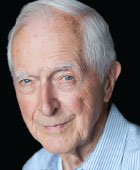It’s my 17th year of living in a retirement facility. My life partner, Jane, died 13 years ago. I’m “alone.” I am currently isolated not just from the rest of the world but from the “others” who live in the 200-plus apartments in this building and 90 more beds in three nursing units. There are no meetings, no gatherings, no visitors. Masks are worn by all employees and recently by all residents. We have to maintain six feet between people even on the elevator.
This experience is not new for me. I worked in a world where I was “alone,” and there were “others.” It was a world of doubts and fears, real and pretend tears, mysteries and mistakes, losses and findings, and continued searching. What can I tell you about those who came through my psychiatrist door? Each had his or her own mask of life’s history.
The year 1918 marked the end of World War I, and the Spanish virus was conquered. Millions died during those times. In 1919 the census increased by one person I know—it is I, Robert McAllister, age 100 and doing well so far. (Thank you, I knew you would ask.) Every day I thank the Lord for my health of body, mind, and spirit. My motto is: Maker provided; owner maintained. I exercise in a 6-by-6-foot space in my living room each morning (some furniture stands on end) and take a walk in the afternoon (weather permitting).
I began a psychiatric practice in 1966 in a suburb of Washington, D.C. I later became superintendent of the state hospital in Reno, Nev. Then to Grants Pass, Ore.; Spokane, Wash; Taylor Manor Hospital in Ellicott City; and then a private practice in Maryland. You ask: What was I looking for?
Psychiatrists are always looking for something, searching the words, watching the expression, speculating what thoughts and feelings are behind the facial mask. The office life is gone, but the patients are still here—in my thoughts, in my prayers, in my reveries. I pray for them all; I read about them in some of the books I’ve written. I remember the girl who was an addict and came for a Social Security evaluation. It still brings tears to my eyes as I read about our meetings. Or the woman I saw in the Reno jail who wouldn’t talk to me when I visited her at the request of Judge Craven. After a half hour, I needed to leave, and as the guard came to open the door, she spoke. Her story lives in my mind. Or the woman arrested at a local grocery store, threatened with jail. My letter to the judge changed his mind for this proud Native American who spoke with the God of the Night Skies.
Patients hid behind the masks of childhood, of married life, of conflicts, of sadness, of excess activity, of strange happenings in their lives. I sat behind my mask (a desk) and ever so gently and thoughtfully removed the pieces of their mask as we explored the virtues and benefits of reality. My mask faltered at times as tears came to my eyes, the fault of my ears unable to shut out the sadness of shattered lives in need of mending.
Am I tired? Yes. Am I grateful for my life? Yes, every bit of it. Three years in the seminary. Left: a life too alone. Over two years in the infantry, France, Germany, Austria. Camp Mauthausen—the Nazi goal was to kill the intelligentsia among the Jews. Much to look back on, much to ponder and to pray about. I have a former patient in the Southwest with whom I correspond. She was planning suicide the first time she came to my office. She was a nun, now happily married. One life is worth my 56 years in psychiatric practice. ■

